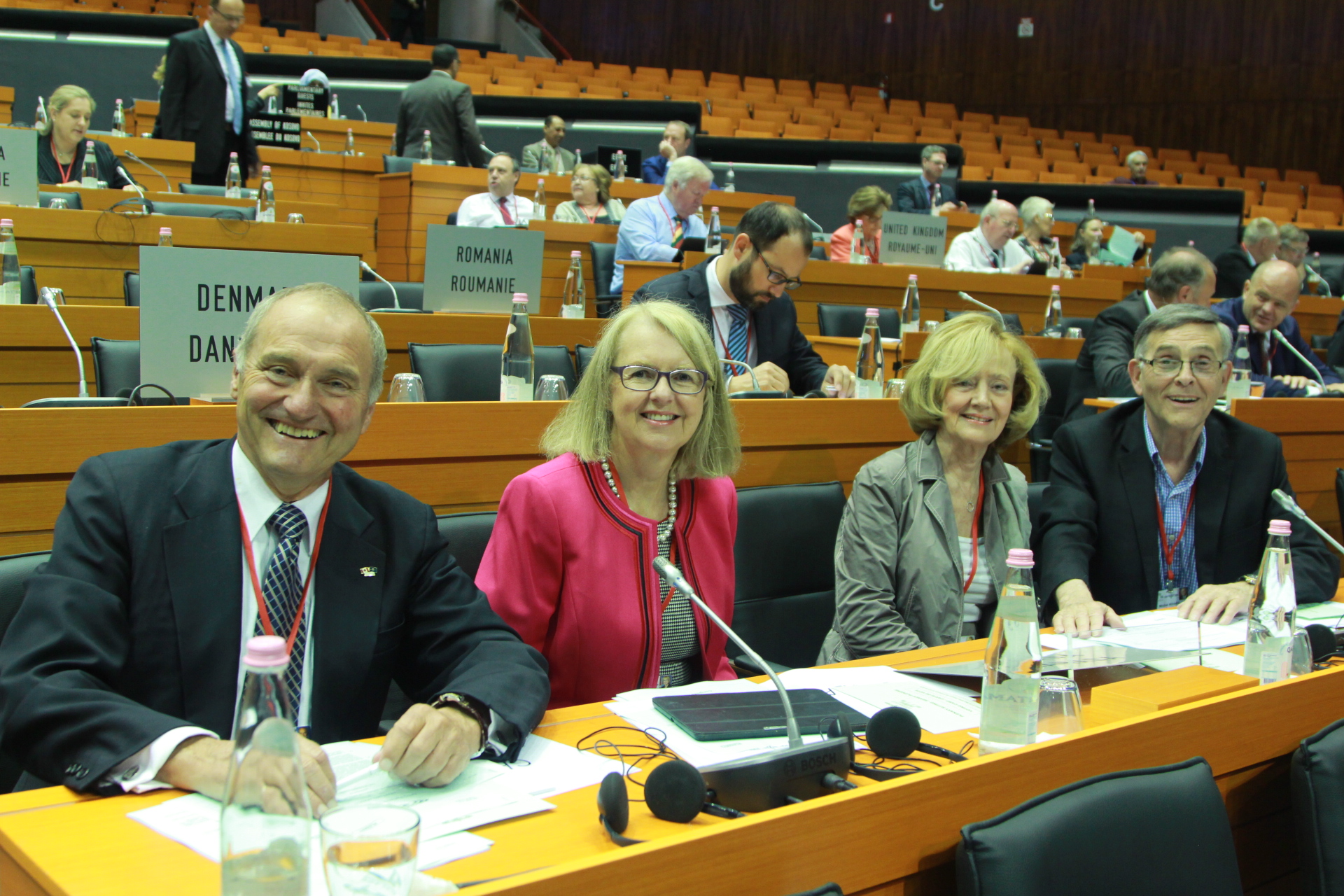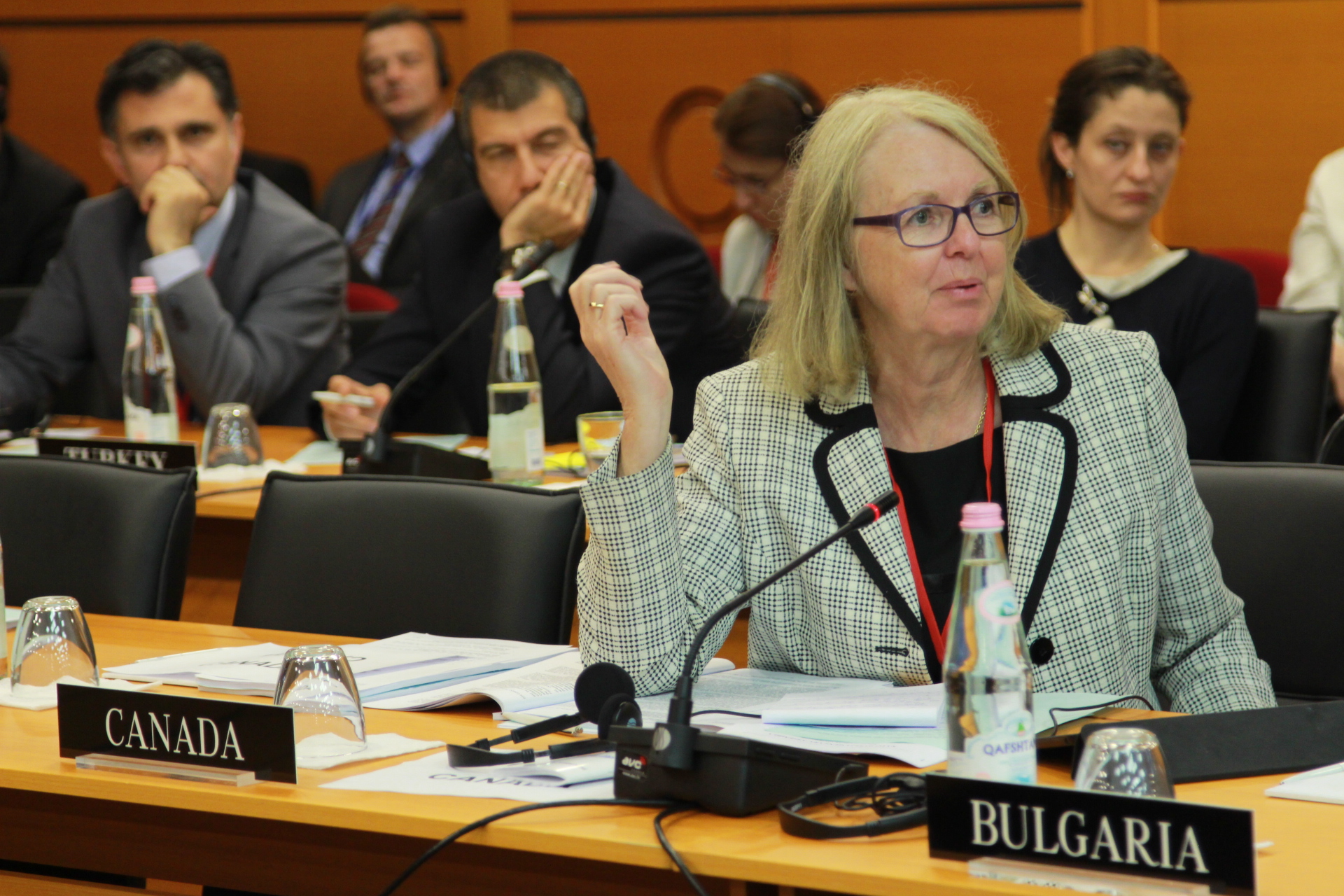Senators Lean in on NATO Assembly

Senators Joseph Day, Jane Cordy, Michel Rivard and Raynell Andreychuk traveled to Albania to represent Canada at the Spring Session of NATO’s Parliamentary Assembly last month.
Roughly 260 parliamentarians from the 28 member countries attended to discuss international security issues.
The conflict in the Ukraine, counter-terrorism, instability in Libya, the migrant crisis, and the rise of China are just a handful of the topics covered over the four-day summit.
Senator Day led the Canadian delegation; he is also Vice-Chair of the NATO Defence & Security Committee and he led the drafting of a new report addressing the evolving threats to European security (or the “dual east-south challenge”).

Along its eastern flank, NATO is dealing with a revisionist and militarily resurgent Russia. To the south, a wide zone of armed conflicts and instability has drawn in foreign fighters from many NATO countries. Non-state armed groups have seized territory, escalated local violence and exported their ideologies and terror globally.
Senator Joseph Day, New Brunswick
I was very pleased to participate in the recent NATO Parliamentary Assembly in Tirana, Albania. Canada plays a major role in NATO. Of course the challenge is to define the role of NATO in today's complex security environment and to respond to the range of threats and risks affecting Euro-Atlantic Security. I am vice Chair of the Civil Dimensions of Security Committee, and I was proud that in that committee Canada was congratulated because of our work in the resettlement of Syrian Refugees.
Senator Jane Cordy, Nova Scotia
Today, Canadian parliamentarians can no longer focus simply on national issues. In this era of instantaneous communication and globalization, major international crises have quickly become hot topics in Canadian news. We’re equally pre-occupied by environmental concerns, North Korea and its nuclear tests, the Islamic State and the War in Syria, as by human rights generally. Parliamentary visits are therefore an extremely efficient way to develop ties with our allies, and strengthen dialogue on such key challenges, in the spirit of democracy and individual liberty. I dare hope that our Canadian delegation was able to give a fresh breath of hope, and convince our allies of the importance and urgency of peaceful solutions.
Senator Michel Rivard, Quebec
The NATO Parliamentary Assembly allows parliamentarians to discuss issues of peace and security and, as well, to become acquainted, through expert testimony, with emerging and existing challenges facing Canada. As a participant in the political committee, I was able to focus emphasis on the continuing violations by Russia of international agreement and norms, particularly of the illegal annexation of Crimea and the violations of the Minsk agreements. I took the opportunity to draw attention to the plight of the Crimean Tatars. I also learnt first-hand the various perspectives on the immigration crisis resulting from the ongoing Syrian conflict and the flux of refugees.
Senator Raynell Andreychuk, Saskatchewan

Related articles
Tags
Committee news
Senators Lean in on NATO Assembly

Senators Joseph Day, Jane Cordy, Michel Rivard and Raynell Andreychuk traveled to Albania to represent Canada at the Spring Session of NATO’s Parliamentary Assembly last month.
Roughly 260 parliamentarians from the 28 member countries attended to discuss international security issues.
The conflict in the Ukraine, counter-terrorism, instability in Libya, the migrant crisis, and the rise of China are just a handful of the topics covered over the four-day summit.
Senator Day led the Canadian delegation; he is also Vice-Chair of the NATO Defence & Security Committee and he led the drafting of a new report addressing the evolving threats to European security (or the “dual east-south challenge”).

Along its eastern flank, NATO is dealing with a revisionist and militarily resurgent Russia. To the south, a wide zone of armed conflicts and instability has drawn in foreign fighters from many NATO countries. Non-state armed groups have seized territory, escalated local violence and exported their ideologies and terror globally.
Senator Joseph Day, New Brunswick
I was very pleased to participate in the recent NATO Parliamentary Assembly in Tirana, Albania. Canada plays a major role in NATO. Of course the challenge is to define the role of NATO in today's complex security environment and to respond to the range of threats and risks affecting Euro-Atlantic Security. I am vice Chair of the Civil Dimensions of Security Committee, and I was proud that in that committee Canada was congratulated because of our work in the resettlement of Syrian Refugees.
Senator Jane Cordy, Nova Scotia
Today, Canadian parliamentarians can no longer focus simply on national issues. In this era of instantaneous communication and globalization, major international crises have quickly become hot topics in Canadian news. We’re equally pre-occupied by environmental concerns, North Korea and its nuclear tests, the Islamic State and the War in Syria, as by human rights generally. Parliamentary visits are therefore an extremely efficient way to develop ties with our allies, and strengthen dialogue on such key challenges, in the spirit of democracy and individual liberty. I dare hope that our Canadian delegation was able to give a fresh breath of hope, and convince our allies of the importance and urgency of peaceful solutions.
Senator Michel Rivard, Quebec
The NATO Parliamentary Assembly allows parliamentarians to discuss issues of peace and security and, as well, to become acquainted, through expert testimony, with emerging and existing challenges facing Canada. As a participant in the political committee, I was able to focus emphasis on the continuing violations by Russia of international agreement and norms, particularly of the illegal annexation of Crimea and the violations of the Minsk agreements. I took the opportunity to draw attention to the plight of the Crimean Tatars. I also learnt first-hand the various perspectives on the immigration crisis resulting from the ongoing Syrian conflict and the flux of refugees.
Senator Raynell Andreychuk, Saskatchewan



